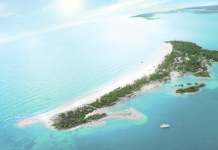PHUKET, 13 October 2025: Few families have shaped Phuket’s future as profoundly as the Na-Ranongs. Their patriarch, Wichit Na-Ranong, former president of the Phuket Hotel Association, was a tireless advocate for the island. He promoted Phuket on the world stage, helping transform it from a tin-mining outpost to a luxury destination.
The family’s first resort, the Pearl Village Hotel, was a hospitality landmark. In the mid-2000s, it was reimagined as Indigo Pearl, and in 2016, it became The Slate, gaining recognition as a collectors’ brand — industrial-chic and deeply rooted in Phuket’s heritage.

Even the island’s landscapes bear their imprint. When a James Bond film introduced the world to Phang Nga Bay’s limestone karsts, one dramatic outcrop became “James Bond Island.” It remains a global symbol of how vision and timing can turn scenery into legend.
Now the family once again reshapes Phuket’s trajectory, offering a deep-water marina site in Sapam Bay that could cement the island’s status as Asia’s yachting capital.
The site encompasses nearly 61,000 square metres of waterfront and 78,000 square metres of adjoining land. Large enough for 200 berths, villas, retail, and a clubhouse, it already carries a Marine Operating Licence — shaving years off the development process.
In a market where suitable deep-water sites are a rare find, the combination of scale, location, and regulatory clearance is extraordinary.
Phuket: Asia’s emerging yachting capital
Phuket already hosts five marinas — Yacht Haven, Ao Po Grand, Royal Phuket Marina, Boat Lagoon, and Chalong Bay. Together they accommodate hundreds of yachts, including mega-yachts up to 100 metres. Yet Thailand has fewer than 2,000 quality berths, far below demand.
Regional benchmarks
The opportunity can be measured against Southeast Asia’s leaders:
ONE°15 Marina, Singapore — 270 berths, including yachts up to 120 metres, paired with lifestyle and retail precincts.
Ocean Marina Yacht Club, Pattaya — with 380 berths, Southeast Asia’s largest, showing the scale possible in Thailand.
Benoa Marina, Bali — expanding to 180 berths, including space for 50 superyachts.
Phuket’s Sapam Bay site could surpass these benchmarks, combining natural geography with global brand recognition.
Beyond berths: Economic multipliers
A marina is far more than docking space. Each berth supports up to four jobs, from engineers to restaurateurs. Two hundred berths could create 800 skilled positions, plus multiplier effects across supply chains and tourism.
Mega-yachts demand advanced support — refits, dry docks, luxury provisioning, crew services — generating resilient, high-value employment. Studies suggest marinas produce higher economic returns than golf courses or convention centres, making them strategic investments.
Government: Marine tourism a priority
Thailand’s government has identified marine tourism as a growth priority. The Tourism Authority of Thailand and Phuket’s Governor endorse the Sapam Bay site, citing its ability to attract high-spending travellers.
Recent Foreign Charter Licence reforms allow international superyachts to charter more easily in Thai waters, improving competitiveness. Infrastructure also supports the vision: Phuket International Airport has expanded long-haul capacity, while roads and five-star hotel developments continue apace.
Site orientation
Located less than a 30-minute drive from Phuket’s Old Town, the prime waterfront parcel covers 6.08 hectares, with capacity for up to 200 vessels. An adjoining 7.8-hectare site offers scope for further development, from waterfront residences and a marina clubhouse to dry-dock facilities and supporting infrastructure.

Phuket occupies a unique maritime crossroads. From Sapam Bay, yachts can cruise north to Myanmar’s Mergui Archipelago, south to Langkawi, and west toward the Maldives. Unlike the Mediterranean, where congestion is seasonal, the Andaman Sea offers year-round cruising and fewer restrictions.
Anchors, Airstrips and A-List Living
Phuket’s marina potential is part of a broader luxury ecosystem. Private jets, speedboats, golf, polo, tennis, wellness retreats, and White Lotus-quality hotels and villas are already in place. Bangkok adds world-class retail — haute couture, gastronomy, fine wines — strengthening Thailand’s overall offer.
What Phuket has lacked is the keystone: a deep-water marina precinct that binds these elements into a coherent luxury proposition.
For the Na-Ranong family, releasing this site is an act of stewardship, not retreat. For investors, it is a chance to shape a harbour that resonates for decades.
About the Author
Andrew J Wood is a former hotelier, Skål International Past President (Thailand & Asia). A long-time Bangkok resident, he has lived in Thailand for over 34 years. Educated in the UK, Andrew is a veteran of the hospitality and tourism industry, with a career spanning more than four decades, including senior positions with leading hotel groups. He is a regular speaker at industry events and a widely published writer on Asian tourism, hospitality, and investment trends in regional online publications.






